July 31, 2014
Waste Management from a Broader Perspective - Lessons Learned from Japan's Experiences
Keywords: Newsletter Reduce / Reuse / Recycle
JFS Newsletter No.143 (July 2014)
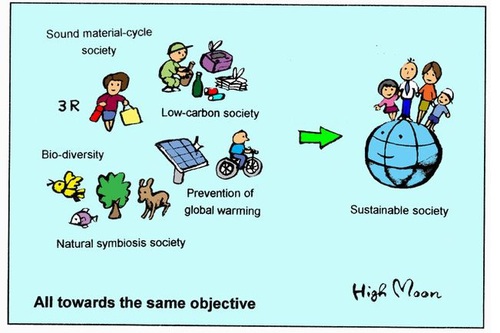
Copyright Hiroshi Takatsuki All Rights Reserved.
Recently I had an opportunity to address to waste managers at governmental level from various Asian nations, at the "Inception and Capacity-Building Workshop on National and City-Level Waste Management Strategies," in Osaka, Japan, from March 12 to 14, 2014. I would like to share lessons learned from Japan's experiences with JFS newsletter readers as well. Here is what I said to the audience.
---------------------------------------
Presentation at Inception and Capacity-Building Workshop on National and City Waste Management Strategies in Osaka, March 14, 2014
Today I would like to share five lessons with you based on Japan's experience with waste management, so that you can better prepare to deal with the issues and problems you are likely to face, and at the same time, contribute to the well-being of your people.
Here are the five lessons and messages I would like to share with you:
- Take holistic views and approaches
- Expect what is coming as the economy grows
- Focus on the upstream
- Use waste management interventions to foster social capital
- Retaining is easier than losing and regaining
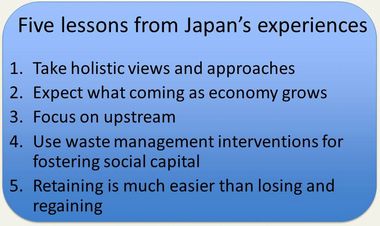
1. Take holistic views and approaches
We sometimes get trapped by "isolated optimization " (or "partial" or "piecemeal" optimization) and lose sight of the whole picture. Too often this applies to managers and persons in charge of specific divisions and areas of responsibility at local, regional and national government. So my first message is "get out of your silo and take holistic views and approaches."
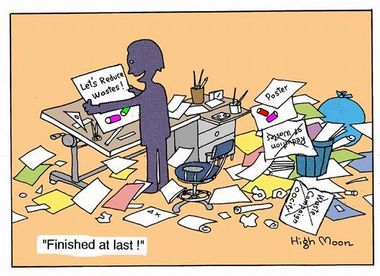
Copyright Hiroshi Takatsuki All Rights Reserved.
All environmental problems are interconnected, and in many cases, driving vicious feedback loops, worsening the situation. This involves waste, of course, but also water, climate change, biodiversity loss, shrinking forests and coral reefs, all kinds of pollution, and so on. Such interlinked problems cannot be solved by an individual division or a single sector.
I know from bitter experience that it is difficult for government officials to get out of their silos and go beyond their own areas of responsibility. But still, I urge you not to lose sight of the whole picture and the interlinked structure you are trying to change for the better.
And it might be good news that all these issues are eventually regarded as "waste problems," so you may discover many opportunities to do interventions on other issues as well.
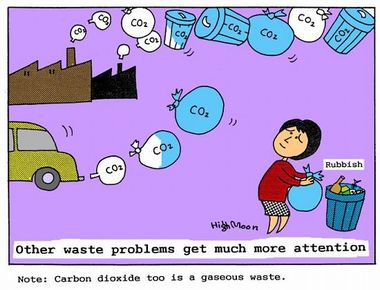
Copyright Hiroshi Takatsuki All Rights Reserved.
Ultimately there are only two kinds of environmental problems on Earth. One is problems on the "source side," pushing the Earth to provide us with more and more resources and energy to feed constant economic growth. This pressure has been creating issues such as shrinking forests, loss of biodiversity, and soil erosion. Another kind of environmental problem is on the "sink side," emitting too much waste, like garbage, CO2, ozone-depleting substances, and other pollutants -- more than the Earth can absorb and detoxify.
Needless to say, sources and sinks are also linked. The more we take out of the Earth, the more waste we produce. So waste management has a strategic function, not only for doing something with garbage, but also for solving many other issues.
Please don't confine yourself in an overly narrow definition of waste management!
In particular, it is important to think about "re-cycling" in terms of a cyclical structure. In order to re-cycle properly, waste should be collected, sorted, and processed back into raw materials. When we started recycling efforts in Japan many years ago, things stopped too soon. The more recycling we did, the more raw materials were produced. But they piled up at the stockyards of recyclers. The loop was not closed !
In order to close the loop, we need manufacturers to use raw materials that came from recycling their products. We also need consumers to buy products made of recycled materials. I believe that creating systems and encouraging manufacturers and consumers to close the loop -- to "re-cycle" -- is something you (waste managers) are in charge of.
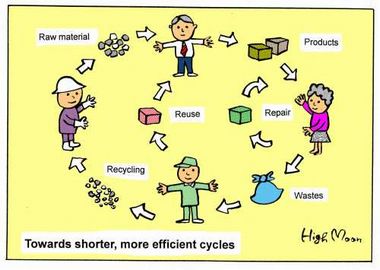
Copyright Hiroshi Takatsuki All Rights Reserved.
And your work will be more effective when you involve people, organizations and sectors beyond a narrow definition of waste management. You are working with recyclers and waste treatment companies, but also with NGOs, citizens, other businesses, media, school teachers and farmers! So get out of your silo!
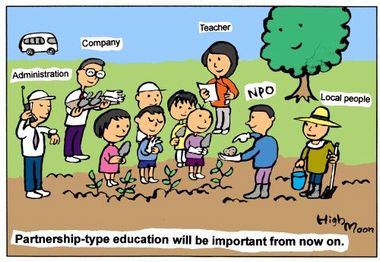
Copyright Hiroshi Takatsuki All Rights Reserved.
As I said, problems at the source and sink are connected. So in order to tackle and reduce the waste you have to handle, we must work on the source side as well.
Today, we need 1.5 Earths to sustain our current level of human activities. This is not sustainable at all.
And the situation has been worsening. Many countries in Asia now have more demand for resources, energy and CO2 sequestration than their land can provide.
You may think that the economy and economic policies are not something you are responsible for, but think about what will happen for waste management if we continue to grow our economies.
We need to create a shared vision among the many stakeholders. When you create a vision, use the back-casting approach. Envision an ideal society and economy in which all people and all living creatures can thrive. What constitutes happiness, well-being, and social progress for your people? What is the role of economic growth in a whole picture?
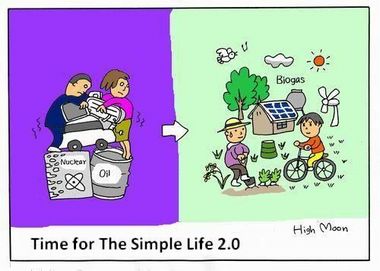
Copyright Hiroshi Takatsuki All Rights Reserved.
2. Expect what is coming as the economy grows
Many developing countries in Asia and the rest of the world are at a crossroads right now. You don't have to repeat the failures and mistakes made by Japan and other countries that developed earlier.
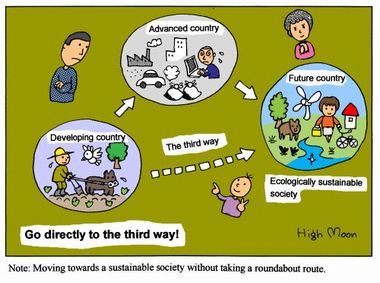
Copyright Hiroshi Takatsuki All Rights Reserved.
You can and should take advantage of your current position in history. There are many ways to avoid what didn't work and use what did work. Developed countries cannot leapfrog over the steps. They have to address the problems they already created during economic development. But developing countries can leapfrog, learning from others. Let me share some of the things you can expect as your countries go along the path of development.
I highly recommend that you put recycling and other effective and efficient waste management systems in place early. Creating a system before you face huge piles of waste is much easier and less costly than after you find yourself in a jungle of waste.
Experience also tells us that people eat out more frequently the richer they become. If your country has not yet reached that stage, congratulations! You have time to plan and create good systems -- with laws, regulations and partnerships -- to address waste from eating out, which is much bigger than you would expect.
Also, in more affluent societies, people tend to have a higher expectation for safety and convenience. Responding to such demands from consumers, food companies tend to set higher standards for their products -- in some cases unnecessarily high -- leading to more waste at production, processing, and distribution stages.
And in more affluent societies, of course, people want a more convenient lifestyle. Can you guess how many convenience stores like 7-Eleven there are in Japan? Close to 50,000. And now almost all convenience stores here sell fresh coffee. This is very popular because it is convenient. You don't have to go to a costly cafe or line up at McDonalds to enjoy coffee.
Can you guess how many cups of coffee are consumed at convenience stores in Japan every year? 700 million cups! Imagine the piles of throw-away paper and plastic cups you might have to deal with as waste managers.
So a piece of advice we can offer from Japan's experiences is to expect what's coming during and after economic development, and get better prepared before it comes. Start creating and integrating effective systems for the near future, while also tackling what you have to do right now.
3. Focus on the upstream
You may be struggling to do something about waste. Recycling. Building waste treatment facilities. Reclaiming coastal land for a landfill waste dump. Does this sound familiar? If not, this is what you can expect to be doing as a waste manager in the near future. But as this cartoon wisely indicates, it is better to focus on things upstream rather than running around frantically downstream.
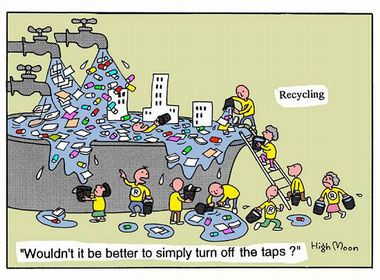
Copyright Hiroshi Takatsuki All Rights Reserved.
Focusing upstream means working with manufacturers. Because it is they who decide how the future waste will be produced. Start working with them for DfE, or Design for Environment. Improve reusability and recyclability, focusing on the ease of disassembly. Inquire about and urge them to consolidate the kinds of materials used. Urge them to reduce the number of kinds of materials. Along these lines, in Japan we have various Eco-Products awards to motivate companies to do technological innovation and development.
Even if manufacturers produce environmentally-better products, it doesn't make sense if they are engaged in mass production urging consumers to do mass consumption and mass disposal. The key is to co-create new business models where manufacturers and consumers can be better off with sufficient production and sufficient consumption.
Focusing upstream also means working with marketers and retailers, because they are the ones who decide how would-be waste items are promoted and sold. If they just promote unnecessary products and persuade consumers to throw away still-usable products, your efforts downstream won't make a big difference.
Focusing upstream also means working with consumers, because they ultimately decide how much and what kinds of waste they will produce. There are three stages for consumers to make decisions.
First, before the use stage, they can decide to reduce or go without consumption.
Second, at the use stage, they can use the products they buy for a longer period of time, rather than throwing things away after just one use.
Third, at the after-use stage, they should be encouraged to reuse and/or recycle.
For the after-use stage, regulations and incentives or disincentives might work. One example is a deposit system for beverage containers. Also, one Japanese company regularly does surprise on-site inspections to check on waste-sorting at its office, and the results affect the cash bonus for the division head.
And in recent years, an increasing number of municipalities in Japan has started a "pay for your waste system." With it, the costs citizens pay for waste treatment depend on the volume of their waste.
Some systems and mechanisms can work beautifully. So start thinking!
As for reduction of would-be waste, I would like you to look at a booklet entitled "Best Practices and Recommendations for Waste Reduction: Towards Sustainable Consumption."
http://www.foejapan.org/en/waste/policy/pdf/140227.pdf
And I think what Korean colleagues are doing is a good practice. In Korea, under "The Act on the Promotion of Saving and Recycling of Resources" enacted in 1993, they set standards for packaging methods and targets for reduction of packages. They also set the minimum percentage of products whose packaging can be reused by repacking or refilling, in comparison of the total production of the product. They also ban single-use packages, such as cups, plates, plastic bags, and so on.
You will find it challenging to persuade consumers to reduce their consumption at the before-use stage and to aim for long use of the products they have purchased at the in-use stage. This is more challenging nowadays, since consumption is done not only to serve the daily needs of living, but also as a source of identity and a sense of happiness.
Consumers consume more things for "wants" than for "needs."
We have to think about what we can offer consumers other than consumption to meet their needs for identity and a sense of happiness. This challenge is what we are struggling with in developed countries as well. People consume things not only for physiological and safety needs, but also belonging and self-esteem needs.
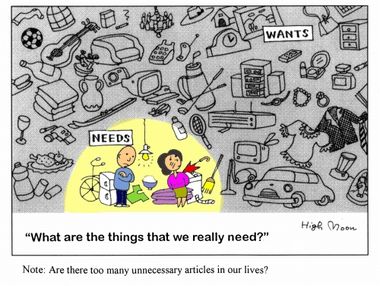
Copyright Hiroshi Takatsuki All Rights Reserved.
One alternative approach is to continue letting consumers use what they want to use for their identity and happiness, but by leasing the physical goods instead of owning them. In other words, people pay only for the utility value of a product, rather than buying the product itself. This approach might lead to less needed material, and less waste.
4. Use waste management interventions to foster social capital
In the Japanese cities of Minamata and Yokohama, officials created platforms or opportunities for citizens to gather together, sort their garbage, and discuss what they should do to reduce their waste. Such waste management interventions targeting citizens have produced dual benefits.
One is a higher recycling ratio and less waste to be treated, as expected. And another benefit, which was not targeted initially and less noticeable, is fostering social capital in the community. It has stimulated many community activities and initiatives. Local NGOs have been born and strengthened. This is a very important aspect, I believe, in terms of enhancing local resilience in the coming era of enormous impacts expected from climate change and other hazards.
In Japan, sharing has become a big boom. And it is also good business. When people share things, you can expect less waste, of course. But sharing also involves conversations and maybe smiles. And it can foster trust and create social capital. In our experience, it is a good idea to make use of waste management interventions to build social capital, since people will need much of it in the near future.
5. Retaining is much easier than losing and regaining
During the Edo Period (1603 to 1867), Japan had a closed-door policy that cut off relations with all other countries. It had a stable population throughout the period at about 30 million people. The city of Edo (which has become Tokyo today) had a population of about one million people, and it was self-sufficient in everything.
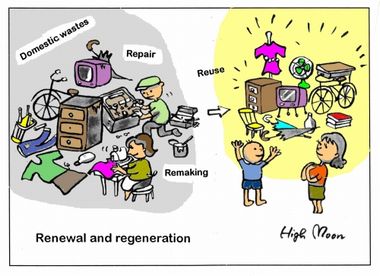
Copyright Hiroshi Takatsuki All Rights Reserved.
The Edo Period was a time of peace, without any war throughout the country. The economy and culture flourished. A truly sustainable society existed back then!
Specialized businesses would purchase waste paper, used clothes, and used pails. There were even businesses that would buy the valuable wax drippings from candles and use them to make new candles to sell. Other businesses would buy the ash left from burning fuel wood and sell it to farmers as fertilizer.
At a time when, in Europe, human waste was thrown out of windows and diseases like the Plague spread across the land, in Japan, even human waste was used as a precious resource to be bought and sold. In fact, human waste from the richer neighborhoods apparently went for the highest prices because it had the highest nutrient content!
Ryoanji Temple in Kyoto has an ancient hand-washing basin engraved with this message:
A man who knows that he has enough is rich even when he is poor. A man who doesn't know that he has enough is poor even when he is rich.
I believe that in Asia, we share -- or should I say "shared" -- this spirit of sufficiency, a sense that "enough is enough." Not demanding more and more, beyond our actual need. Unfortunately Japan lost almost all of this spirit of sufficiency during decades of high economic growth. We need to regain and rebuild this culture again.
But if your country still has such important values, culture, and mindsets among the people, please make an effort to retain and enhance them. Retaining is much easier and less costly than losing and regaining.
That's all from my side -- five lessons and messages on waste management, based on Japan's experience. Now you know what's coming if you don't take action. It's up to you to change the course for the better.
Thank you very much.
Written by Junko Edahiro
Related
"JFS Newsletter"
- 'Good Companies in Japan' (Article No.4): 'Eightfold Satisfaction' Management for Everyone's Happiness
- "Nai-Mono-Wa-Nai": Ama Town's Concept of Sufficiency and Message to the World
- 'Yumekaze' Wind Turbine Project Connects Metro Consumers and Regional Producers: Seikatsu Club Consumers' Co-operative
- Shaping Japan's Energy toward 2050 Participating in the Round Table for Studying Energy Situations
- 'Good Companies in Japan' (Article No.3): Seeking Ways to Develop Societal Contribution along with Core Businesses


